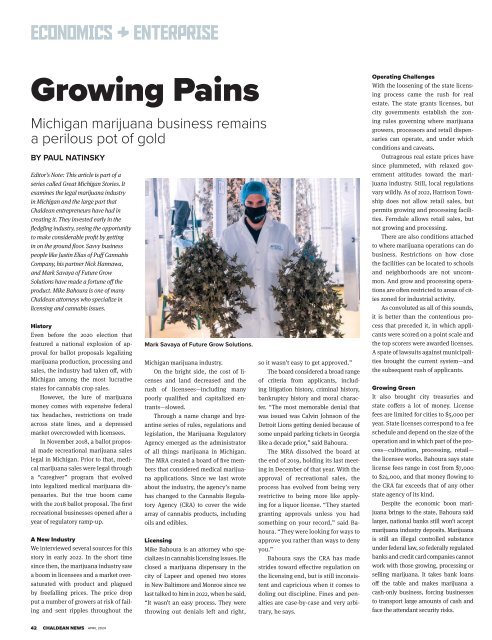You also want an ePaper? Increase the reach of your titles
YUMPU automatically turns print PDFs into web optimized ePapers that Google loves.
ECONOMICS & ENTERPRISE<br />
Growing Pains<br />
Michigan marijuana business remains<br />
a perilous pot of gold<br />
BY PAUL NATINSKY<br />
Editor’s Note: This article is part of a<br />
series called Great Michigan Stories. It<br />
examines the legal marijuana industry<br />
in Michigan and the large part that<br />
Chaldean entrepreneurs have had in<br />
creating it. They invested early in the<br />
fledgling industry, seeing the opportunity<br />
to make considerable profit by getting<br />
in on the ground floor. Savvy business<br />
people like Justin Elias of Puff Cannabis<br />
Company, his partner Nick Hannawa,<br />
and Mark Savaya of Future Grow<br />
Solutions have made a fortune off the<br />
product. Mike Bahoura is one of many<br />
Chaldean attorneys who specialize in<br />
licensing and cannabis issues.<br />
History<br />
Even before the 2020 election that<br />
featured a national explosion of approval<br />
for ballot proposals legalizing<br />
marijuana production, processing and<br />
sales, the industry had taken off, with<br />
Michigan among the most lucrative<br />
states for cannabis crop sales.<br />
However, the lure of marijuana<br />
money comes with expensive federal<br />
tax headaches, restrictions on trade<br />
across state lines, and a depressed<br />
market overcrowded with licensees.<br />
In November 2018, a ballot proposal<br />
made recreational marijuana sales<br />
legal in Michigan. Prior to that, medical<br />
marijuana sales were legal through<br />
a “caregiver” program that evolved<br />
into legalized medical marijuana dispensaries.<br />
But the true boom came<br />
with the 2018 ballot proposal. The first<br />
recreational businesses opened after a<br />
year of regulatory ramp-up.<br />
A New Industry<br />
We interviewed several sources for this<br />
story in early 2022. In the short time<br />
since then, the marijuana industry saw<br />
a boom in licensees and a market oversaturated<br />
with product and plagued<br />
by freefalling prices. The price drop<br />
put a number of growers at risk of failing<br />
and sent ripples throughout the<br />
Mark Savaya of Future Grow Solutions.<br />
Michigan marijuana industry.<br />
On the bright side, the cost of licenses<br />
and land decreased and the<br />
rush of licensees—including many<br />
poorly qualified and capitalized entrants—slowed.<br />
Through a name change and byzantine<br />
series of rules, regulations and<br />
legislation, the Marijuana Regulatory<br />
Agency emerged as the administrator<br />
of all things marijuana in Michigan.<br />
The MRA created a board of five members<br />
that considered medical marijuana<br />
applications. Since we last wrote<br />
about the industry, the agency’s name<br />
has changed to the Cannabis Regulatory<br />
Agency (CRA) to cover the wide<br />
array of cannabis products, including<br />
oils and edibles.<br />
Licensing<br />
Mike Bahoura is an attorney who specializes<br />
in cannabis licensing issues. He<br />
closed a marijuana dispensary in the<br />
city of Lapeer and opened two stores<br />
in New Baltimore and Monroe since we<br />
last talked to him in 2022, when he said,<br />
“It wasn’t an easy process. They were<br />
throwing out denials left and right,<br />
so it wasn’t easy to get approved.”<br />
The board considered a broad range<br />
of criteria from applicants, including<br />
litigation history, criminal history,<br />
bankruptcy history and moral character.<br />
“The most memorable denial that<br />
was issued was Calvin Johnson of the<br />
Detroit Lions getting denied because of<br />
some unpaid parking tickets in Georgia<br />
like a decade prior,” said Bahoura.<br />
The MRA dissolved the board at<br />
the end of 2019, holding its last meeting<br />
in December of that year. With the<br />
approval of recreational sales, the<br />
process has evolved from being very<br />
restrictive to being more like applying<br />
for a liquor license. “They started<br />
granting approvals unless you had<br />
something on your record,” said Bahoura.<br />
“They were looking for ways to<br />
approve you rather than ways to deny<br />
you.”<br />
Bahoura says the CRA has made<br />
strides toward effective regulation on<br />
the licensing end, but is still inconsistent<br />
and capricious when it comes to<br />
doling out discipline. Fines and penalties<br />
are case-by-case and very arbitrary,<br />
he says.<br />
Operating Challenges<br />
With the loosening of the state licensing<br />
process came the rush for real<br />
estate. The state grants licenses, but<br />
city governments establish the zoning<br />
rules governing where marijuana<br />
growers, processors and retail dispensaries<br />
can operate, and under which<br />
conditions and caveats.<br />
Outrageous real estate prices have<br />
since plummeted, with relaxed government<br />
attitudes toward the marijuana<br />
industry. Still, local regulations<br />
vary wildly. As of 2022, Harrison Township<br />
does not allow retail sales, but<br />
permits growing and processing facilities.<br />
Ferndale allows retail sales, but<br />
not growing and processing.<br />
There are also conditions attached<br />
to where marijuana operations can do<br />
business. Restrictions on how close<br />
the facilities can be located to schools<br />
and neighborhoods are not uncommon.<br />
And grow and processing operations<br />
are often restricted to areas of cities<br />
zoned for industrial activity.<br />
As convoluted as all of this sounds,<br />
it is better than the contentious process<br />
that preceded it, in which applicants<br />
were scored on a point scale and<br />
the top scorers were awarded licenses.<br />
A spate of lawsuits against municipalities<br />
brought the current system—and<br />
the subsequent rush of applicants.<br />
Growing Green<br />
It also brought city treasuries and<br />
state coffers a lot of money. License<br />
fees are limited for cities to $5,000 per<br />
year. State licenses correspond to a fee<br />
schedule and depend on the size of the<br />
operation and in which part of the process—cultivation,<br />
processing, retail—<br />
the licensee works. Bahoura says state<br />
license fees range in cost from $7,000<br />
to $24,000, and that money flowing to<br />
the CRA far exceeds that of any other<br />
state agency of its kind.<br />
Despite the economic boon marijuana<br />
brings to the state, Bahoura said<br />
larger, national banks still won’t accept<br />
marijuana industry deposits. Marijuana<br />
is still an illegal controlled substance<br />
under federal law, so federally regulated<br />
banks and credit card companies cannot<br />
work with those growing, processing or<br />
selling marijuana. It takes bank loans<br />
off the table and makes marijuana a<br />
cash-only business, forcing businesses<br />
to transport large amounts of cash and<br />
face the attendant security risks.<br />
42 CHALDEAN NEWS <strong>APRIL</strong> <strong>2024</strong>
















